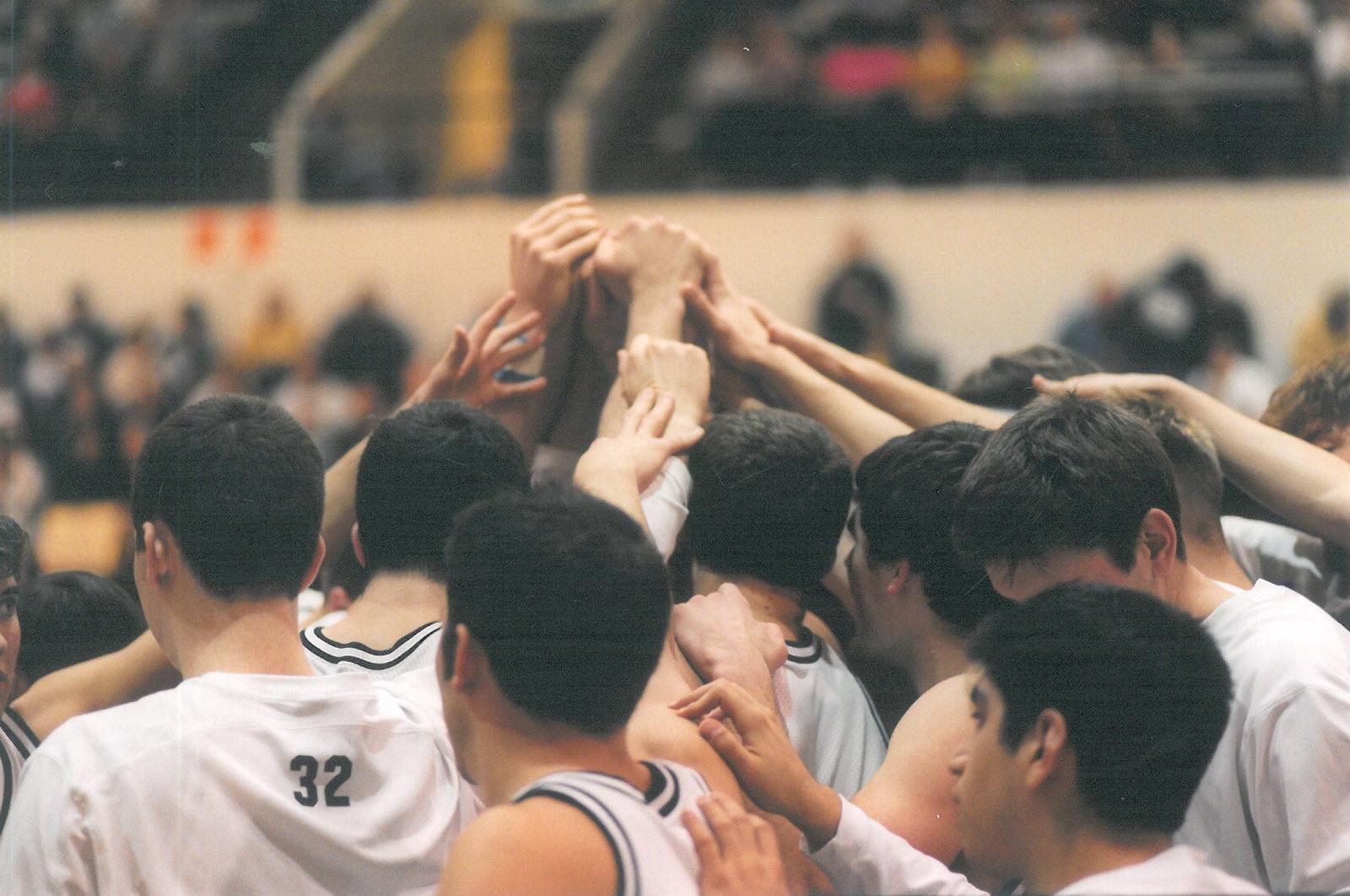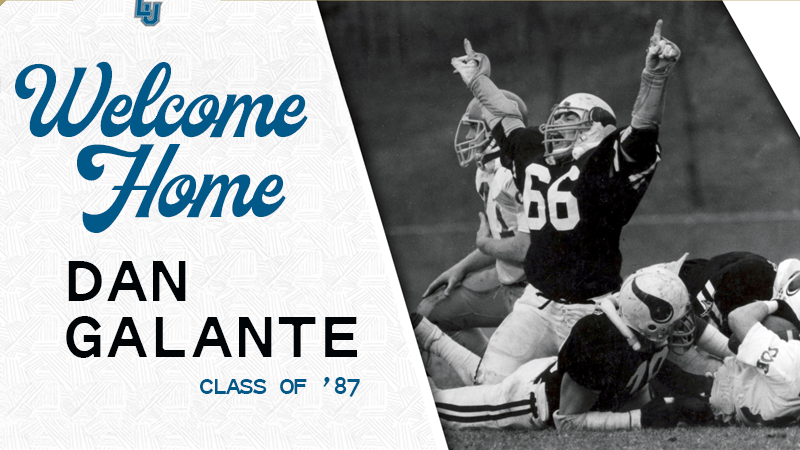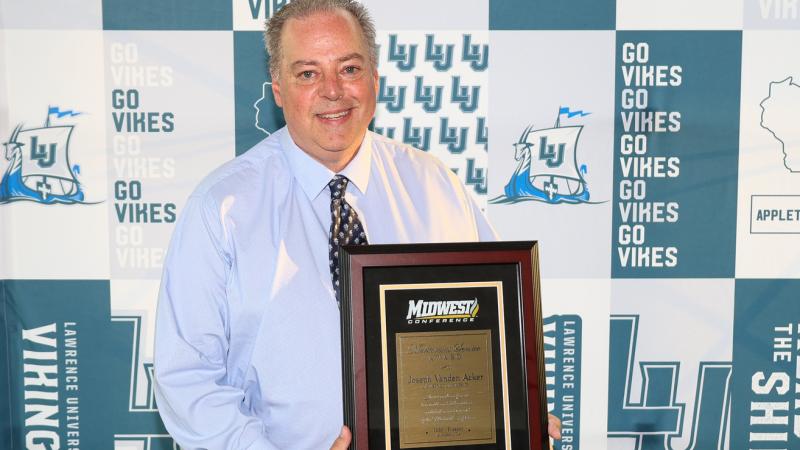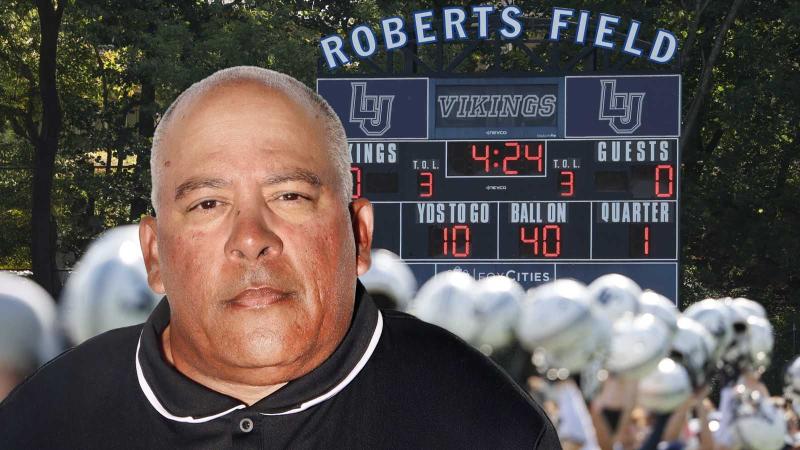Sometimes madness can be found in the unlikeliest of places.
Those who have even a passing curiosity of college basketball know the month of March is an unfolding tapestry of drama and strategy, unabashed joy and cruel heartbreak, playing out on hardwood courts across the country, often in spacious arenas housing hoops royalty but sometimes in small but achingly charming gymnasiums far from the spotlight.
So begins our flashback to 15 years ago, when the men’s basketball team from Lawrence University began its own magical dance through March Madness. It was a run that took the Vikings to the Division III Elite 8 before they suffered an agonizing 1-point overtime loss to the eventual national champions in a game that the then-Lawrence coach calls one of the greatest college basketball games ever played — even though the gymnasium in Tacoma, Washington, was mostly empty.
No, this is not a story that ended with a national championship. History rarely remembers a team that came up two games short.
But March Madness is different. A good Cinderella story has legs, made of moments and memories that live on.
Until March 2004, Lawrence had never won an NCAA tournament game. Ever. It hadn’t happened in 101 years.
They would win three on this post-season journey, a fourth slipping from their fingers, a Final Four berth just a few ticks of the clock out of reach.
Division III gets little love from national media, so this wasn’t quite the hysteria of Maryland-Baltimore County beating top-seeded Virginia last year. But it was big here. The Post-Crescent, the daily newspaper in Appleton, chronicled Lawrence’s run through the 2004 tournament with equal parts excitement and astonishment.
— — —
“Those brainiacs over at Lawrence showed they can ball with anybody on the Division III level, and those of you who were paying attention no doubt had quite a ball following their Shock the Nation National Tour. One point, one play from a spot in the NCAA Division III Final Four. Lawrence University? Tell you what, folks, on a larger scale, this would be like Lehigh making it to the Elite Eight in Division I.” Mike Woods, The Post-Crescent
— — —
Still winning
As we check in with that 2003-04 team 15 years later, we find that those players who posted a 24-5 record and went undefeated at Alexander Gymnasium were far more than basketball players. It turns out they were scholars, embracing the academic side of Lawrence as fervently as they attacked their basketball preparations.
Chris Braier, a sophomore that season who would go on to become the most accomplished player in Lawrence history, would also earn the status of Academic All-American. Now 34 and a physician assistant in Chicago, he earned his MBA in December from Northwestern University and has added clinical health care consultant to his resume.
Three other players from that team are now doctors — Kyle MacGillis, a hand/wrist/elbow surgeon in Oak Lawn, Illinois, Jason Holinbeck, an orthopedic surgeon in Wichita Falls, Texas, and Brett Sjoberg, a radiologist in Madison.
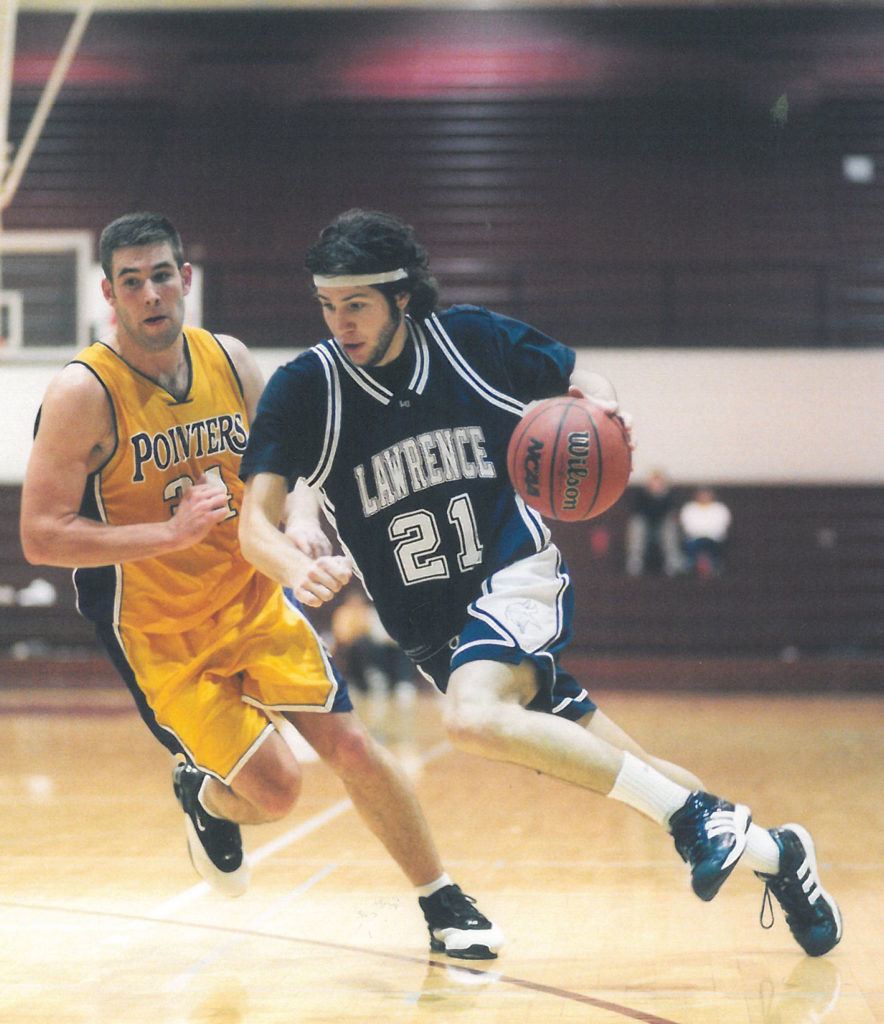
Kyle MacGillis drives to the basket against UW-Stevens Point in the 2003-04 NCAA Division III tournament.
Chris MacGillis, brother of Kyle and the leading scorer with 22 points in that Elite 8 game, earned his law degree and is now a partner in a Milwaukee area law office.
Ben Klekamp earned his doctorate and now works as an epidemiologist in Florida.
Another is a college basketball coach, another a financial advisor, another a director of business development, another a manager of a regional business. The list goes on.
Count John Tharp, the then-34-year-old coach of that team, impressed. Not surprised, but impressed.
“The greatness of that run wasn’t necessarily just the wins,” Tharp says as he chats from Hillsdale College, where he now coaches the Division II Chargers. “The greatness of the run was the collection of people that we had in the program at that time. You want to epitomize what a student-athlete is, it was the collection of guys that were on that basketball team.”
— — —
“This whole experience has left a mark that will never go away, and that’s a good thing. For the journey was full of tales and memories that have no shelf life.” Mike Woods, The Post-Crescent
— — —
A historic run
By the time the tournament began in early March 2004, the Lawrence campus had already taken notice that something special was going on. Despite having no player taller than 6’6″, the Vikings had imposed their will as they marched through the Midwest Conference schedule.
As the season rolled on, Alexander Gymnasium got down-right rowdy. It was full. It was loud.
The Appleton Fire Department had to turn people away because of fire code concerns.
“The vibe around campus, people were really excited,” Braier says. “The first game, there was a row of chairs along the baseline at Alex, and by the end of the year they had to build a whole new bleacher section on the baseline because of the crowds.
“When you would come to games, a lot of times the women would play before us, so you would come in during the first half of the women’s game, and you started noticing that there would be a line to get into our games. You couldn’t find a parking spot an hour and a half before the game. That’s when you start thinking, man, this is kind of a big deal.”
They won all 12 home games.
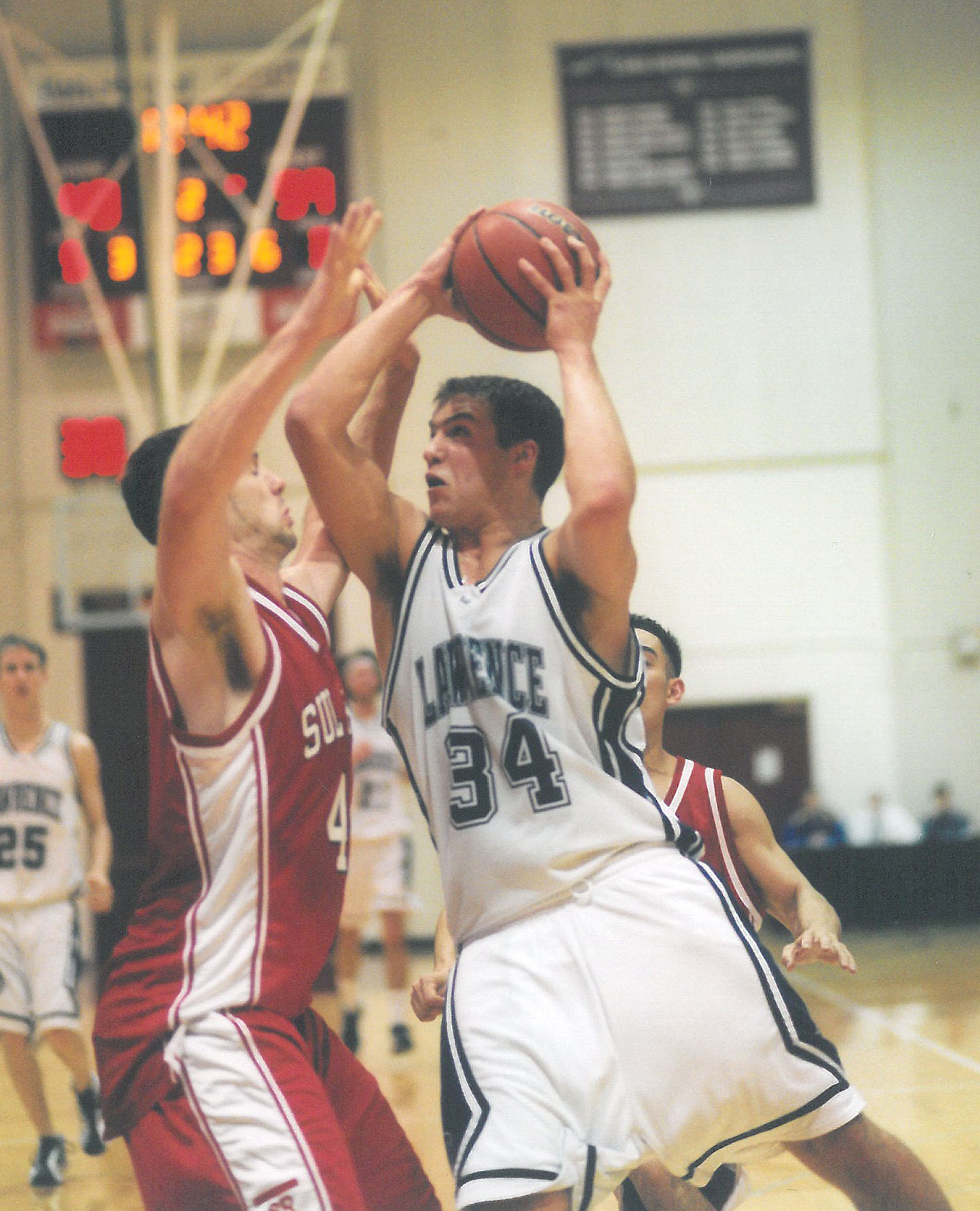
Chris Braier, here playing against Sul Ross State in the 2003-04 NCAA Division III tournament, was inducted into the Lawrence Athletic Hall of Fame three years ago.
Then came the tournament. The run began with a first-round 86-51 blowout of Lakeland at a packed Alexander Gym.
“I can remember diving for a loose ball into the standing room-only crowd in one of the corners and realizing that they’re 10 deep in the corners to watch this game,” Braier says.
Then it was on to Storm Lake, Iowa, a seven-hour bus trip into the round of 32.
“When we went to play Buena Vista and we were in Storm Lake, Iowa, we had a ton of students who were at that game,” Tharp recalls. “That’s a great effort to be there. It was amazing. To come out of that locker room and to see how many Lawrence kids were there, and just people from Appleton who were not even necessarily connected to Lawrence, that was incredibly special.”
Lawrence would beat Buena Vista 72-66, sending them to the Sweet 16 in Tacoma and a match up with Sul Ross State, a team from Alpine, Texas, loaded with size and talented junior college transfers. It was unchartered territory for any school from the Midwest Conference, which had never seen a team advance past the second round.
A thrilling 86-79 overtime win that included a late double-digit comeback moved the Vikings to the Elite 8 and a showdown with the University of Wisconsin-Stevens Point, a Division III power located just 60 miles west of the Lawrence campus but light years away in terms of basketball history. The Pointers at the time had advanced to the Elite 8 twice in the previous decade and would go on to win back-to-back national championships in 2004 and 2005.
It was a nail-biter, neither team giving ground, filled with drama to the end — witnessed by no more than 400 or so people in a college fieldhouse nearly 2,000 miles from home. A late Stevens Point three-pointer sent the game into overtime — a bonus five minutes — and then Lawrence’s improbable journey came crashing down in the waning seconds of that extra period.
A made basket by the Pointers to retake the lead. Then a last-second shot that would have won the game for Lawrence fell short. The scoreboard read 82-81.
“I just remember being completely exhausted, dropping to the floor,” Braier says.
Just like that, the ride was over.
“You felt like that last shot, how does that not go in?” Braier says. “It’s like we were in a movie. In the movie, that shot goes in.”
Puget Sound, the host school, had lost the night before to Stevens Point. Thus, witnesses in the arena that night were few.
“There weren’t more than 300 or 400 people in the crowd at that game, and it was probably one of the greatest college basketball games ever played,” Tharp says. “It was a phenomenal game.”
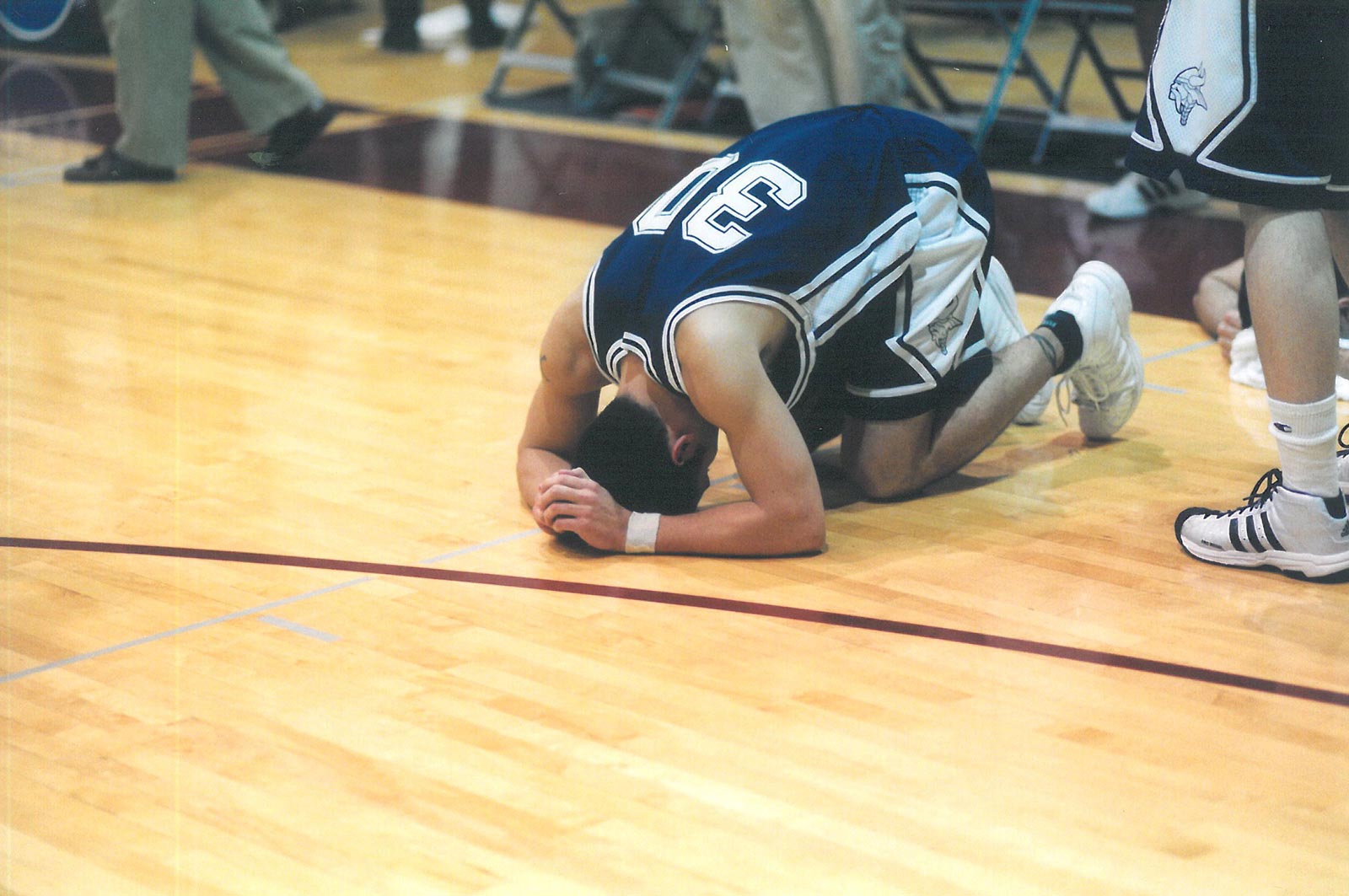
Rob Nenahlo falls to the floor as the game against UWSP ends one point short.
Stevens Point would roll through the next two games to claim a national championship. Lawrence was left with what might have been.
“I think when you talk to everybody they all think we were one or two possessions away from maybe having a chance to win a national championship,” Tharp says.
After the game, even the Stevens Point coach wished aloud that both teams could move on.
— — —
“The Vikings would have gladly jumped at that invitation to play one more game together. On Sunday, though, the talk in the airport was already moving to this week’s final exams on campus, spring-break trips and other ‘real life’ adventures. The team knew that this particular group, like all teams, only receives one chance to write its story.” Dick Knapinski, The Post-Crescent
— — ——
“I think there was a sense of disappointment and heartbreak after that loss,” Tharp says. “Afterwards, and over the years, I think there is an obviously special place in everybody’s hearts about the run that was made.”
For Chris MacGillis, a senior on that team, the end of the journey hurt more than missing out on a chance at a national championship.
“I wasn’t emotional because we lost and I thought we should have won,” he says. “I just remember becoming emotional because of how proud I was and how happy I was to be with this group of guys. We were a very tight group. We all relied on each other and we all cared about each other, and we still do to this day. I was more emotional about not being able to do this with these guys anymore than I was about losing.”
Lawrence would continue to dominate the Midwest Conference for the next couple of years, going undefeated in the 2005-06 regular season and claiming the school’s first-ever No. 1 national ranking. They’d win a couple more tournament games, as well. But they never quite recaptured the glory of 2004.
“It really was magical,” MacGillis says.

Chris MacGillis
Still together
Fifteen years later, most of the players on that team remain connected. There are job changes and weddings and children and other life moments to navigate. But the bonds formed during that memorable season remain to this day. For basketball players, a March Madness experience, no matter if it’s under the bright lights of D-1 or in the more dimly lit shadows of D-3, lodges in your soul and stays there forever.
When Braier was inducted into Lawrence’s athletic hall of fame three years ago, many of the players from that team made their way back to Appleton. Braier said it was a reminder to him of how special that group was.
“I always thought, man, these guys are ridiculously smart,” Braier says. “That was my first thought when I first dealt with my teammates.
“I don’t think at the time you realize how special of a group of individuals this was. It was just an everyday thing. … Everyone was such a high achiever. You didn’t think it was anything different. But then when you stepped away or you talked to friends from other teams, that’s when you realized it.”
The coaches remain as connected as the players, despite a decade and a half of travels and life experiences separating them from those three weeks of madness.
“Those guys are part of my life, and obviously things have changed a little bit with me being at a different school and those guys are all over the country now, but I think everyone knows where everybody is at and what everybody is doing,” Tharp says. “But what makes it special, I still think to this day if anybody needed anyone else on that team, I think everybody would still be there for each other.”
Braier is getting married in September and most of his Lawrence teammates will be there.
There’s also a Las Vegas getaway every March that reunites many of them. No better time than March to recall that fleeting moment when Lawrence basketball got to dance.
“Man, I could talk about this forever,” Braier says.
